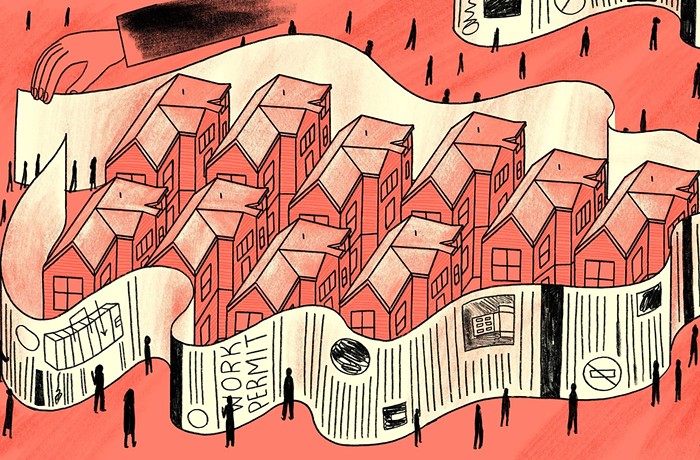
It’s well before sunrise when they start showing up downtown, hefting their tool buckets, lunches, hard hats and harnesses on their way past the chain-link fences: Carpenters, electricians, ironworkers, cement masons, laborers, painters, plumbers, crane operators, and more. These are the men and women who daily apply their skill, strength, and ingenuity to build the apartment buildings, roads and bridges, office towers, and transit systems that make Seattle run.
But these workers increasingly can’t afford to live in the city they build. The same corporate landlords and developers who hire their labor have jacked up housing costs to stratospheric levels. Average rents are over $2,000 per month, and an average home costs a mind-boggling $800,000. At the same time, the contractor bosses make millions of dollars by blatantly pushing construction costs on the backs of workers. One strategy is to make construction workers pay for their own parking.
At a downtown job site, that means a construction worker has to shell out $20-30 a day in parking costs to park in private lots before even clocking in to work. Moving your car every 2-4 hours for street parking isn’t a reasonable expectation when you’re working on a high rise in the middle of your shift.
Over the course of a year, this can take upwards of $7,000 in wages out of the worker’s pocket. That money goes into the pockets of the wealthy developers and other business elite who are profiting from the construction boom.
Two weeks ago, union rank-and-file carpenters said they had had enough of this rank exploitation. They went on strike after rejecting the fourth consecutive, inadequate contract offer from the Association of General Contractors, the employer group.
Over the last two weeks, I’ve marched many hours on picket lines with rank-and-file carpenters, and I’ve seen time and again how their frustration has boiled over. And the first strike demand many cite is that the contractor bosses fully pay for parking. Their other demands are fully-funded benefits, family-supporting wages, improved protections against workplace harassment, and a 3-year contract to align them with the rest of the trades.
Unlike other workers, carpenters and other construction workers can’t simply take mass transit to their jobs. Many of them have to punch in early in the morning, before most buses and trains are running. And all of them have to bring their hand tools, harnesses, and other equipment to the job. They have to drive in.
Shamefully, the contractors, who have made billions in profits, have refused, in bargaining with the Northwest Carpenters Union, to cover this unavoidable cost. I unwaveringly support the carpenters in their strike. Alongside this, my office has also begun working on legislation requiring contractors to pay all of the parking costs of construction workers on all Seattle job sites. My ordinance will cover not just the union carpenters who are on strike, but all construction workers.
Last week I received a letter signed by over 80 rank-and-file carpenters, thanking our Council office for actively supporting their strike, and urging us to do everything possible to help them achieve a resounding victory.
That is exactly what my office is going to do. We have launched a community petition, calling on the City Council Democrats to publicly support and vote for my legislation. Everyone can sign it - both construction workers and working people as a whole.
Some of our adversaries will claim that my ordinance would constitute a shocking break from the City’s role in overseeing labor-management affairs. That is not true. My legislation’s pay-for-parking requirement for contractors is no different from the City requiring employers to meet other employment standards, like minimum wage, paid sick and safe time, secure scheduling, and the Commuter Benefits Ordinance, which lowers costs for other downtown workers.
We fully expect that the contractors and big business will fight our ordinance tooth-and-nail. A sliver of their eye-popping profits is at stake. We also should expect the Democratic political establishment to come up with excuses about why they can’t impose this cost on contractors, or why it should be narrowed to include only some construction workers, or otherwise try to water down the legislation. They will try to divide workers, perhaps claiming that some do not “deserve” to have parking paid for.
It won’t be easy to win. We will have to build a powerful, determined movement of construction workers, with support from both unionized and non-unionized workers in all industries, to achieve a victory. And meanwhile, the carpenters’ strike should continue to insist that the contractors agree in bargaining to pay for parking.
The carpenters are the ones who have raised the prominence of this issue through their brave, rank-and-file strike. All workers owe them a debt of gratitude for their demonstration of determination and tenacity, and for leading in the pay-for-parking demand.
Their fight is our fight, too. If the carpenters and other construction workers win fully-paid parking, it will be a victory for all working people in Seattle, because it will strike an important blow against the wealthy elites, and show what is possible when the working class builds its collective power to fight back.


















